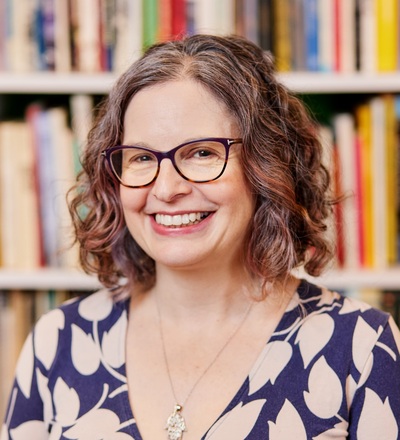By Rebecca Amato
For 25 years, The Odyssey Project/Proyecto Odisea in Chicago, a core program of Illinois Humanities, the state’s humanities council, has been providing community-based learning spaces for income-eligible adults who have had little or no access to higher education.
Thanks to faculty and administrative champions at University of Illinois Chicago (UIC) like Jennifer Brier, Distinguished Professor of Gender and Women’s Studies and History, UIC has been Illinois Humanities’ partner in this work since 2020. Together, UIC’s College of Liberal Arts and Sciences and Illinois Humanities ensure that students receive high-quality instruction and credits in the interdisciplinary humanities.
This partnership is a testament to efforts across the University of Illinois System to make higher education accessible to more Chicagoans and Illinoisans.
The Odyssey Project/Proyecto Odisea offers classes in four locations in Chicago — on the South, North, and Southwest Sides (a Spanish-language class), and in the Loop. Students who participate can earn up to 11 credits at no cost after completing a three-semester sequence of courses co-taught by local college and university instructors and organized around humanities themes that resonate transhistorically and across disciplines.
In May, The Odyssey Project/Proyecto Odisea in Chicago graduated 51 students, its largest graduating class since the COVID-19 pandemic started in 2020.
See The Odyssey Project’s impact
Explore adult learning system wide
Deliberation and discussion
That academic year, students did everything from analyzing and writing ekphrastic poems to critiquing different concepts of Latinoamerica, from Calle 13 to Jose Marti, to learning about and discussing the Harrison High School protests of 1968, which gave us Benito Juarez Community High School, one of Chicago’s first bilingual schools.

Rebecca Amato, Academic Director of The Odyssey Project/Proyecto Odisea at the University of Illinois Chicago
DeleteEdit embedded media in the Files Tab and re-insert as needed.
They drew connections between texts across time, like Emily Dickinson’s poetry and Octavia Butler’s novels, and, in every class, they explored the ideas and expressiveness of Gloria Anzaldua’s Borderlands/La Frontera, 2025’s Odyssey/Odisea universal text.
Through deliberation and discussion, students bridged their classroom activity with their home and work lives, as well as their personal histories, in ways that gave fresh meaning to familiar texts.
As Director of Teaching and Learning at Illinois Humanities, affiliated faculty in UIC’s History department, and the Academic Director of The Odyssey Project/Proyecto Odisea, I have the great fortune to witness what spaces like ours — anchored in community, reverent toward students’ life experience, and committed to dissolving institutional barriers to lifelong learning — can mean to our participants.
In their own words
Each year I receive notes of gratitude from students. Here’s one:
I can’t thank you enough for the opportunities you have helped provide. There were many things I sacrificed or took for granted during my youth. To be afforded the chance to do certain things at this stage of life is pretty amazing. I experienced college and now I don’t want to turn it loose. Gratitude is not even a big enough word to use to express my appreciation. I am learning and still evolving.
And this one:
I am greatly appreciative of the program and all the fantastic things I’ve benefited from ... including (but definitely not limited to!), shaping me into a successful student again, preparing me for college-level material and discussions, the assistance in child care while I attend the class, the Christmas party, the graduation, the informative emails, the wonderful and powerful instructors (whom I still think about).
My response is always that Odyssey does not work without them.
We can provide books and supplies, modest financial support, and compassionate, skilled instruction, but the students and part-time staff, who are alumni of Odyssey/Odisea, are the community-builders and accountability-keepers.
They have taught me the importance of sustaining the joy of learning and of creating supportive spaces for respectful, shared exploration. They have also taught me about their own lives and the creative ways they have pursued their passion for reading and self-expression outside educational institutions.
And they have shared wisdom and vulnerability in ways that speak to the potency of the humanities to heal and forge bonds across difference.
A shift in perspective
When asked why this program is important to me, I used to focus solely on access and the elimination of barriers to higher education for adult learners with limited incomes. Now I also believe that colleges and universities need students like ours to learn to transform what it means to pursue deeper understanding, seek truth, and build a self-reflexive, deliberative, inclusive civil society.
In other words, I used to think our students needed access to higher education; now I believe higher education needs access to our students. Illinois Humanities has long championed the necessity of the humanities in fostering a healthy civic life. By investing in this pathway for low-income adult students, Odyssey/Odisea makes that case with both vision and conviction.
***
Applications to join The Odyssey Project/Proyecto Odisea for the 2026-27 academic year open March 1. Learn more or drop us a line at odyssey@ilhumanities.org.